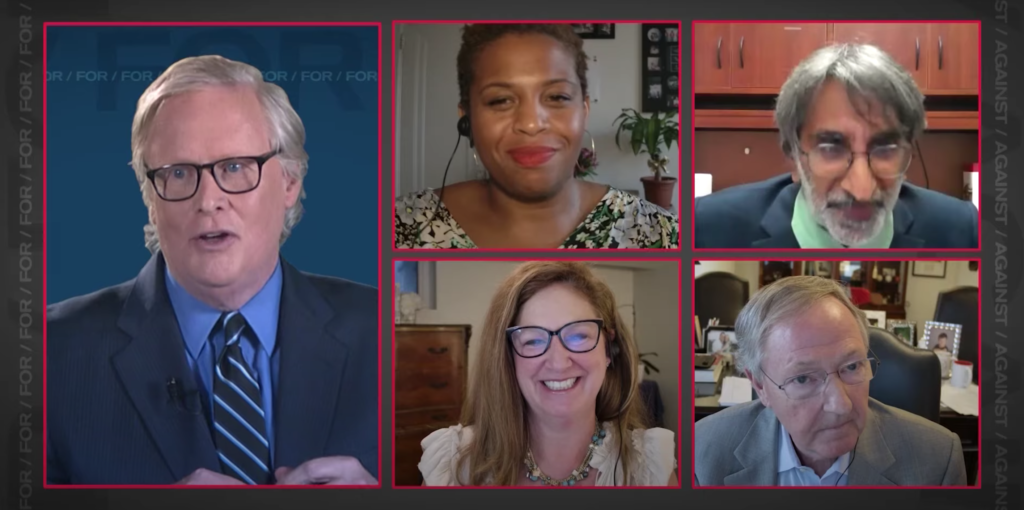Questions to Ask About Government Use of Deepfakes
Northwestern researchers examine the potential harms to democracy. Will the lure of deepfakes prove irresistible to democratic governments? What questions should governments ask — and who in ...
10.06.2021
Law, Business, Tech Alumni Events
On September 30, Northwestern Pritzker School of Law and Intelligence Squared hosted the fourth Newt and Jo Minow Debate, “We Should Expand the Supreme Court.” After the 60-minute debate, which was later posted to the Intelligence Squared YouTube page, the team arguing against the motion was victorious.
Journalist John Donvan hosted the pre-taped event, while the debaters were stationed across the country. Arguing for the motion were Tamara Brummer, political organizer, strategist, and director of National Outreach at Demand Justice; and Dahlia Lithwick, legal commentator and host of Slate’s Amicus Podcast. The panelists arguing against the motion were Akhil Reed Amar, constitutional scholar and law professor at Yale University; and Carter Phillips (MA ’75, JD ’77), Supreme Court and Appellate litigator.
Donvan introduced the debate, which consisted of opening arguments, a back and forth between the sides, and closing statements. He also pointed out the history of this conversation. This is not the first time that court expansion has become a part of the political discussion. In 1937, President Franklin D. Roosevelt tried to add justices to the Supreme Court in support of his New Deal program, but was denied by Congress. Since President Biden’s inauguration, the conversation has been brought back into the zeitgeist. “Our democracy is crumbling and the Supreme Court is the tool of choice for dismantling it,” Brummer said in her opening statement. “Organizing workers across the country, I’ve learned that if someone with more power than you is telling you to trust the system and keep your head down, [then] they’re probably doing well under the status quo and you’re getting screwed.” She continued, stating that the Republican-majority Court allows an unbalanced, outdated majority that is detrimental to progress. Lithwick agreed, adding: “I think the Court has done an immense amount of mischief in secret, unexplained and unjustified, and at the same time [they] are stomping around and telling us that we should treat them as if they’re magic.”
Amar, arguing against the motion, stated that the Supreme Court is not in crisis and said that adding more seats to the Court would introduce more harm than good in the long run. “When you change the size of the Court for purely partisan advantage, then what goes around comes around,” he said. “When the other side comes in…you add six, they add 12, then you add 18, and things start spiraling out of control.” Amar noted that he does believe the system can be improved and supports term limits, something his partner, Phillips, agreed with. “I don’t dispute what Dahlia or Tamara have said about the problems that have risen with the Court, but those are not problems that are created by the number nine,” Phillips said. “Packing the Court wasn’t right in the 1930s, packing the Court is not right today. There are other solutions.”
For much of the event, Donvan questioned the points made on both sides. At the conclusion of the debate, the winner was determined by which team had swayed the most votes. At the start of the debate, 41 percent of the live audience was against the motion that we should expand the Supreme Court. At the end, 55 percent of the audience was against the motion, crowning the opposing side—Amar and Phillips—the winner.
Following the debate, Donvan held a live discussion with the four debaters, as well as Robert Rosenkranz, founder of Intelligence Squared U.S, and David Ariosto, head of editorial for Intelligence Squared. Donvan also took questions from the live audience.
The Newton and Jo Minow Debate Series was established as part of a generous gift from friends and colleagues of Newton N. Minow (JD ’50) to honor his numerous contributions to public and civic life. Minow is the originator of the televised U.S. presidential debates, which inspired the idea to honor his legacy with a permanent debate program at Northwestern Law.
Northwestern researchers examine the potential harms to democracy. Will the lure of deepfakes prove irresistible to democratic governments? What questions should governments ask — and who in ...
On February 1, Northwestern Pritzker Law, in collaboration with the School of Communication, held “Generative AI+Entertainment: Opportunity, Ethics, and Law,” a collaborative conference that ...
The Task Force’s 20 judges, practitioners, and academics are charged with gathering knowledge and recommending how the Illinois Judicial Branch should regulate and use AI in the future.